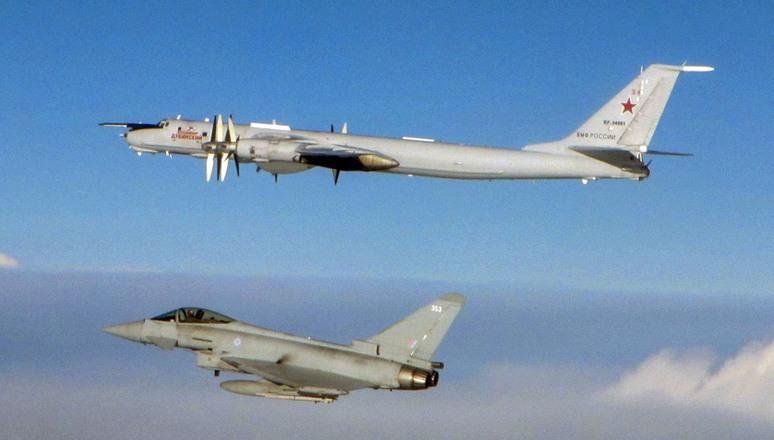NATO said Monday that it has intercepted hundreds of Russian planes in 2020, including the pictured Tu-142 bomber, top, that was escorted out of British airspace in March. Photo courtesy of NATO
Dec. 28 (UPI) -- Over 400 interceptions of unknown aircraft in NATO airspace, nearly all responses to Russian military planes, occurred in 2020, NATO said on Monday.
It noted that the figure is a modest increase over the 2019 total, and that 90 percent of the intercept flights involved the approach of Russian aircraft.
In a Monday statement, NATO added that the Russian planes do not emit transponder signals or communicate with air traffic controllers, making them potential hazards to civilian aircraft.
"In recent years, we have seen an increased level of Russian military air activity close to the Alliance's borders," NATO spokesperson Oana Lungescu in a press release.
"We are always vigilant. NATO fighter jets are on duty around the clock, ready to scramble in case of suspicious or unannounced flights near the airspace of our Allies. Air policing is an important way in which NATO provides security for our members," Lungescu said.
Forty air surveillance and reporting hubs constantly monitor NATO airspace in Europe, and about 60 planes stand ready at all times for quick response, the statement said.
Russian planes were routinely discovered and intercepted over North America in 2020 by the North American Aerospace Defense Command, as well.
An October incident off the coast of Alaska, involving Russian bombers and U.S. Air Force F-22 Raptor fighter planes, was the 14th intercept of the year in the area, NORAD said, and categorized as routine.
A NORAD spokesman said at the time that about six or seven interceptions per year near Alaska has been typical since 2007, when Russia restarted its long-range bomber program.
The Russian overflights increased in the summer of 2020, with several NORAD reports in June and in August.
The increase in incidents comes as the European Leadership Network, a London-based foreign policy research group, urged a de-escalation of NATO-Russia security risks.
In a Dec. 8 paper, the ELN said that "the security situation in Europe has deteriorated to its lowest point since the end of the Cold War."
"NATO and Russian military forces operate in much closer proximity than just a few years ago, previous lines of NATO-Russia communications have broken down, and the nuclear and conventional arms control system that took decades to build is rapidly unravelling, with nothing to take its place," the group wrote.
ELN called for "re-establishing practical dialogue between Russia and NATO, including direct contacts between the military commanders and experts of Russia and NATO member states," and "developing common rules that will reduce the risk of unintended incidents on land, air and sea."















